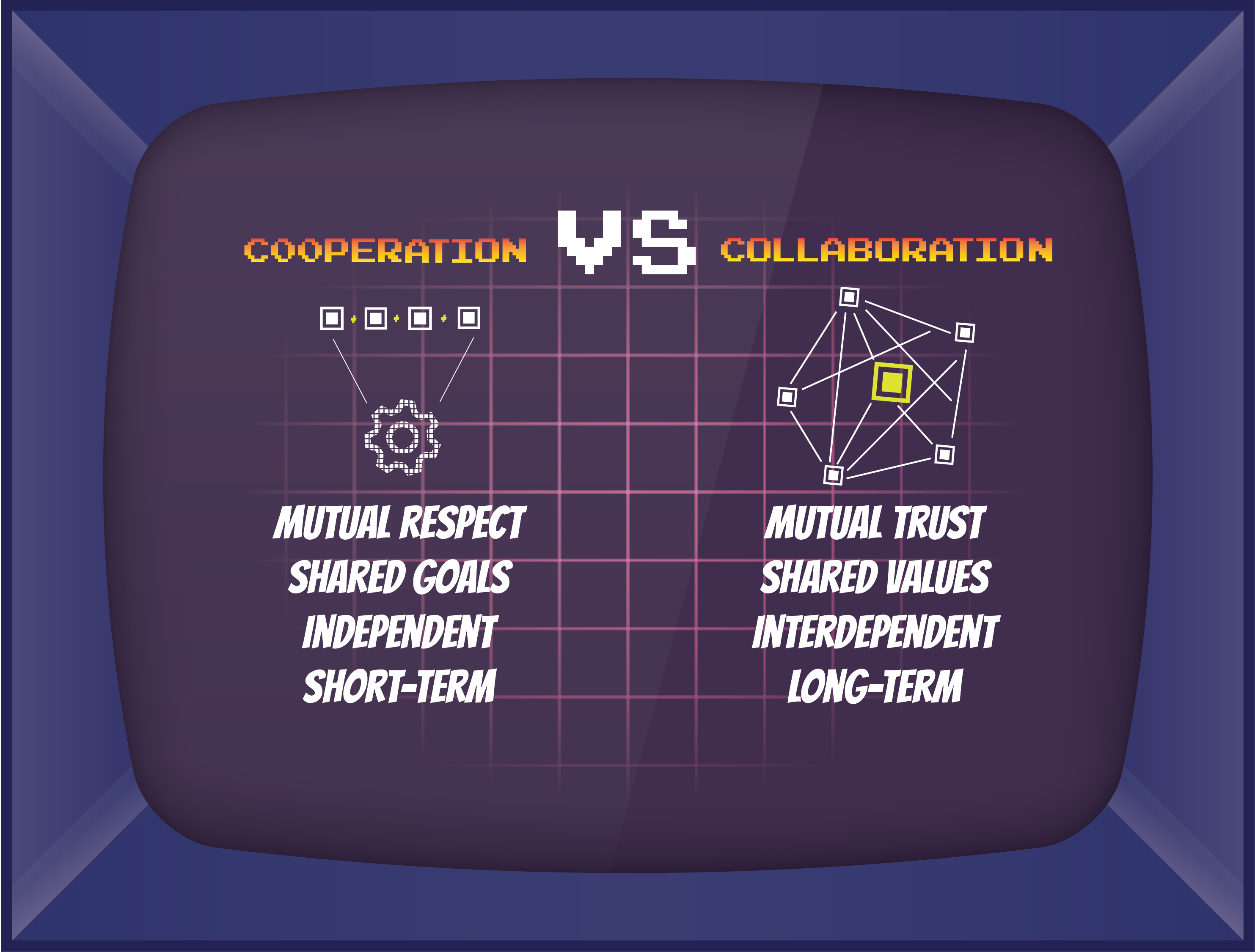Collaboration
Common Dilemmas
Why Collaboration?
Collaborative efforts on complex world problems.
In the face of the increased complexity of our world, the future problems awaiting us will only be more complicated and unpredictable than ever. To forge answers to world problems, past experiences of single professions alone are no more than a mere guide for reference. The road to efficacy relies more heavily on collaboration among people of different knowledge and skills as they contribute to a shared goal by shedding light through diverse perspectives.
In this video, you will learn from Dorothy about how extraordinary people collaborate to achieve exceptional success in all missions.
The Future of Learning: From Multidisciplinary to Interdisciplinary
In the future, where flexible, collaborative boundaries will become the mainstream, collaboration and cooperation in a multidisciplinary team are becoming highly sought-after professional competencies. Graduates are required to be open-minded to new thoughts and have the willingness to confront the uneasiness of working with different minds as they work their way to innovating solutions to world problems. To nurture professionals for global careers, the University provides multidisciplinary learning opportunities that allow students of various schools and disciplines to collaborate towards a common goal and make connections across a diverse array of knowledge and skills.
Collaborations at work
When solving problems, it is inarguable that the contribution of every team member is equally important and impactful to the overall success or failure of the team. Collaboration is the practice of working together to achieve a common goal.
Henry Ford once said, "Coming together is a beginning. Keeping together is progress. Working together is a success.” However, collaboration at work is a concept that is easier said than done. It is getting more common to see people being protective towards their work, less willing to share skills, and working on their own for personal attainments. Their falling short of collaboration may bring an immediate reward, but it cannot benefit them in the long term. Instead, a highly collaborative workplace draws on the strengths of different colleagues and recognizes their contributions/achievements.
Collaboration is Multiplication
In this video, by looking at a real-life rescue mission of the Thai Cave, we can see the importance of good collaboration in bringing people of different skills and knowledge together. Apart from the international rescue team, the boys and the coach were also playing a crucial role in getting themselves out of danger despite having no expertise comparable to the rescue professionals. No superhero was involved in the rescue of these 12 boys and their soccer coach from the cave, yet, this no-one-man-can-save-all example in the real world allows us to understand the importance of a collaborative effort.
What is collaboration?
Changemaking: The ultimate intertwining of skills, passions, and knowledge
The simplest way to define collaboration is how two or more people work together towards shared goals. Collaboration can be much more than that. Good collaboration needs to be built like an ecosystem, and it is important to let everyone realize that they are a key part of each achievement and transformation. It requires our communication skills, emotional intelligence, and respect for diversity. With an open mind, we communicate and work together towards the possibilities to explore and generate new ideas instead of creating challenges that would paralyze the team.
Research collaboration on COVID-19
Scientists around the world collaborate to do marvels in coronavirus research. This case has again proved the saying, ‘Alone we can do so little, together we can do so much’. Through a collaborative effort, we witnessed a tenfold increase in virus-related research publication and a major breakthrough in vaccination in a short period of time. Watch this video to learn more about the impressive collaborative success in human history.
Collaboration vs Cooperation
Wherever we are, our ability to work with others to achieve the desired outcome of a shared goal is highly valued. There is no less emphasis on the two words: cooperation and collaboration. Although they both work hand in hand interchangeably in the real world, they operate under two distinctive mindsets.
Cooperation is a more coordinated accomplishment by the division of labour among team members where each person is responsible for solving a portion of the common goal. People who cooperate in a group would focus on their parts to fulfil the instructions to reach a mutual goal for the individual benefits.
On the other hand, collaboration is how a group of people contribute their best to wherever in need of them in support of a shared goal. It is more than just completing individual tasks. A truly collaborative environment empowers the group to share their views, knowledge, schedules, and worries about the outcome as a whole.
All in all, there is a nuance in collaboration that is shared identity over individual identity. Below is a visual summary of the differences between cooperation and collaboration.

Collaboration and Cooperation in Context
An interwoven effort of collaboration and cooperation is critical when solving major problems and/or making significant achievements. Some of us may collaborate with our expertise while others cooperate with one another, working together to meet expectations. Whatever role we play, our contribution has a direct relationship with the outcome.
How to collaborate successfully?
“If you want to go fast, go alone. If you want to go far, go together.”
Even when everyone is somehow experienced in working with others or in teams, how many of us have exhibited qualities needed for a successful collaboration? Being a collaborative team player is equally as important as being a competent leader who fosters a creative and collaborative environment that embraces diversity for innovation.
The sense of ownership makes all the difference. If we hold ourselves accountable for the outcome, we will tend to take an extra step to consider all aspects and help others to achieve the desired outcome.
To build a culture of effective collaboration that feels truly comfortable working together for all, here are the five ways for us to bear in mind:
Video: Dorothy on Improving Empathy